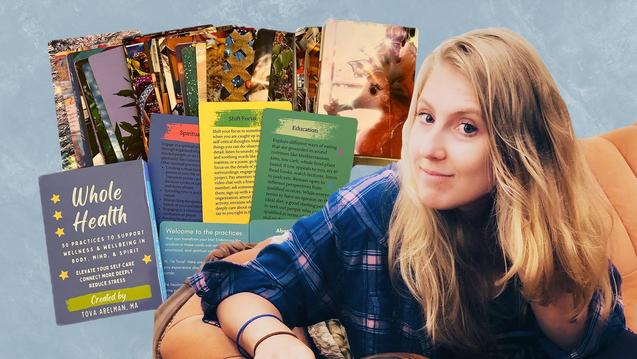An interview with Drama Therapy alumna Grace Walcott about her documentary, “River of Life LGBTQ+”

Why I Became a Health Coach and Mind-Body Specialist
Integrative Health Studies alum Laura Matteliano is having an impact on the world by using her skills to help others
Laura Matteliano graduated from CIIS' Integrative Health Studies program in 2014 - a master's program that offers an embedded Certificate in Health Coaching. She is now a senior health coach at Better Therapeutics (formerly FareWell), a San Francisco-based company that combines digital tools with health coaching to treat chronic disease.
What made you want to be a health coach, and what made you choose the Integrative Health Studies program at CIIS?
I first learned about health coaching after looking into the Integrative Health Studies program at CIIS. I didn't know the field existed! I was in a professional transition at the time from a career in the performing arts. I wanted to do something in the health and wellness field, but not in a traditional, clinical way like becoming a nurse, therapist, or dietitian. The more I read about coaching, the more it felt aligned with what I wanted to do. I believed that coaching could result in transformational change and would also allow me to incorporate my passion for somatic practices like yoga, meditation, and imagery. It was a lightbulb moment!
Can you talk about your experience in the program?
My aim in attending the Integrative Health Studies program was to develop the skills I needed to work on an interdisciplinary health team as a health coach and mind-body specialist. Between my first and second years, I interned at a yoga travel startup that organized retreats around the world. While still in school and post-graduation, I worked as a health promotion manager with Optum, a health services company, and taught worksite yoga classes.
For my thesis project at CIIS, I implemented an eight-week course in mindfulness-based stress reduction (MBSR) for middle managers. The goal was to understand the effects of meditation on stress and workplace relationships.
Now that you are in the work world, can you talk about the strengths of the program?
The Integrative Health Studies program broadened my perspective on what health and healing can be. I grew up in a family of health professionals—pharmacists, doctors, nurses—so my experience with health was strictly through an allopathic lens. At my core, I always believed health to be much greater than a diagnosis and prescription, but didn't have the language or even the validation that that could be true. Working in corporate wellness and now on an interdisciplinary health team as someone who is not clinically trained, it is important to have a strong foundation in basic health principles and to be able to communicate with other health professionals.
How did you land your current job?
In the spring of 2016, I was contacted by Mark Berman of Better Therapeutics through a referral by the Integrative Health Studies chair, Meg Jordan. I was hired as a health coach and then promoted to senior health coach in 2017.
Talk about health coaching in the context of your job.
Coaching is a meditation practice for me. The cornerstone pillars of meditation—nonjudgmental awareness, cultivating a beginner's mind to promote curiosity, and being present in the moment—are all foundational characteristics of coaching presence. In that way there isn't a separation between what I "do" in my career and who I strive to be in my personal life.
I love that my job challenges me professionally and personally. I'm a huge people person, so it's only natural for me to work with others. There is nothing more rewarding than bearing witness to a person who is changing their life right before my eyes! At the end of the day, it's about people helping other people.
When I think about how I want to look back on my life, my greatest hope is that I can make an impact on the world by contributing my skills and desire to help others. My current job allows me to fulfill that vision each day.
Can you give an example of a health coaching approach that you feel really works?
I love opening a session by asking a positive psychology-based question. For example, "What's one thing you can celebrate since our last session?" or "What is one thing that has made you smile this week?" It starts the session on a motivating note and allows the member to open herself up to possibilities instead of problems. It's a simple but effective way to infuse positivity.
Is there research to support the efficacy of health coaching?
Yes. A recent 12-week study of patients with type 2 diabetes who used our program showed promising results. The intervention consists of digital tools like a customizable meal plan and smart shopping list in addition to working with a personal health coach. The coaching sessions were every other week for 30 minutes, and focused on goal setting, providing accountability, and. most of all, support. We chose to first test our intervention in a population with type 2 diabetes. By demonstrating effectiveness in people with type 2 diabetes, we can start new research in the effectiveness of the program on other chronic diseases, including hypertension.
Do you see health coaches playing a major role in the future of health care?
I believe health coaches are going to play a huge role in health care in the next few years, if not decades, to help solve the crisis of chronic disease. Given that 80 percent of the country's healthcare dollars are spent on lifestyle-related cardiometabolic disorders like type 2 diabetes, hypertension, and hyperlipidemia, there is an urgent need for health professionals to intervene.
Health coaches are uniquely positioned to work with individuals to change their habits because of our training in behavior-change theories, goal setting, working with ambivalence, and using a strengths-based approach. But before health coaching becomes a widely accepted position within health care, more research is needed to better identify and define our role. My hope is to add to this research to advance the field, and advocate for the need for health coaches in the health-care system!
Related Academic Program
Related News
An interview with CIIS alumna Tova Abelman about her recent publication of the Whole Health Card Deck, which helps users connect to six key facets of wellness.
CIIS Professor Jason Butler discusses his new book on the potential, pitfalls, and guidelines for psychedelic medicine and care in treating mental illness.



